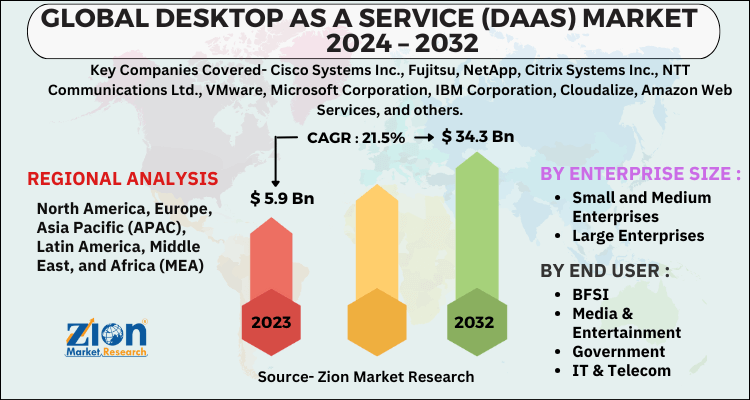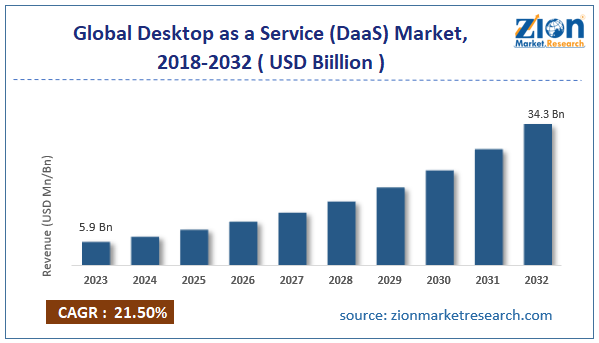Desktop as a Service (DaaS) Market Size, Share, Trends, Growth, 2032

Desktop as a Service (DaaS) Market By Enterprise Size (Small and Medium Enterprises and Large Enterprises), By End User (BFSI, Media & Entertainment, Government, IT & Telecom, Healthcare, Manufacturing, Education, and Others), and By Region - Global and Regional Industry Overview, Market Intelligence, Comprehensive Analysis, Historical Data, and Forecasts 2024 - 2032
| Market Size in 2023 | Market Forecast in 2032 | CAGR (in %) | Base Year |
|---|---|---|---|
| USD 5.9 Billion | USD 34.3 Billion | 21.5% | 2023 |
Desktop as a Service (DaaS) Industry Prospective:
The global Desktop as a Service (DaaS) market size was worth around USD 5.9 billion in 2023 and is predicted to grow to around USD 34.3 billion by 2032 with a compound annual growth rate (CAGR) of roughly 21.5% between 2024 and 2032.
Desktop as a Service (DaaS) Market: Overview
Desktop as a service (DaaS) is a method of delivering whole virtual desktop environments to customers via the cloud, including operating systems, programs, data, and user preferences. Desktops run in virtual machines that are hosted on cloud-managed computing, storage, and network infrastructure. Users can use their desktop environment through PCs, laptops, tablets, and smartphones. Several organizations are looking for an alternative to the traditional desktop deployment strategy, which involves IT managers installing an operating system and software on each employee’s device. With that strategy, administrators frequently spend too much time and money installing software, managing upgrades and updates, and securing devices.
Key Insights
- As per the analysis shared by our research analyst, the global Desktop as a Service (DaaS) market is estimated to grow annually at a CAGR of around 21.5% over the forecast period (2024-2032).
- In terms of revenue, the global Desktop as a Service (DaaS) market size was valued at around USD 5.9 billion in 2023 and is projected to reach USD 34.3 billion by 2032.
- The increasing remote and hybrid work culture is expected to drive the Desktop as a Service (DaaS) market over the forecast period.
- Based on enterprise size, the large enterprise segment is expected to dominate the Desktop as a Service (DaaS) market over the forecast period.
- Based on end user, the BFSI segment is expected to hold the largest market share over the forecast period.
- Based on region, North America is expected to dominate the market during the forecast period.
Desktop as a Service (DaaS) Market: Growth Drivers
Growing demand for work flexibility drives market growth
To boost output and job happiness, organizations must effectively manage their personnel. As a result, it employs a range of working paradigms, including a hybrid one. Using a hybrid working style has several advantages for employees, companies, and the environment. Employee freedom, output, and job happiness all rise as a result. It expands the talent pool and lowers office space maintenance and rental costs for businesses. About 52% of workers are anticipated to think about working for a fully remote or hybrid organization in the upcoming year, per a Microsoft study. As a result, desktops as a service are becoming more and more popular due to the growing need for work flexibility. Businesses that need to quickly expand or contract their workforce in response to shifting market conditions may find this flexibility advantageous. 82% of IT leaders want to work with technology that supports the emerging ideals of the workplace, per a Lenovo survey conducted in 2022. Together with rising consumer spending on smartphones and digitalization, these developments are fueling the Desktop as a Service market expansion.
Desktop as a Service (DaaS) Market: Restraints
Security and privacy concern hinders market growth
The Desktop as a Service (DaaS) market takes security and privacy issues very seriously since companies have to guarantee the integrity, confidentiality, and availability of their data as they migrate to cloud-based solutions. These issues can be a focus for innovation among service providers as well as a deterrent to market acceptance. Especially if the DaaS provider's infrastructure is not appropriately secured, keeping data on outside servers raises the danger of cyberattacks, illegal access, or breaches. Furthermore, under strict regulations (e.g., GDPR, HIPAA), companies in sectors including government, finance, and healthcare ensure compliance when data lives on outside servers can be difficult, especially in cases when providers lack required certifications.
Desktop as a Service (DaaS) Market: Opportunities
The introduction of sustainable device-as-a-service offers a lucrative opportunity for market growth
The growing introduction of sustainable device-as-a-service will provide a potential opportunity for the Desktop as a Service (DaaS) industry over the projected period. For instance, in April 2024, leading digital business and IT services provider NTT DATA partnered with HP to create a Sustainable Device-as-a-Service solution that integrates the circular economy and sustainability into end-to-end device lifecycle management. Sustainability may be operationalized and integrated into the endpoint device lifecycle by enterprises due to the solution. As part of its comprehensive strategy, NTT DATA assists businesses in expediting their whole sustainable transformation process, from reaching Net Zero goals to beyond.
Desktop as a Service (DaaS) Market: Challenges
Dependency on network infrastructure poses a major challenge to market expansion
Real-time data transmission is necessary for virtual desktop performance. Particularly for resource-intensive applications like design or video editing, network latency, jitter, or packet loss can cause responsiveness delays that impair user experience. Furthermore, seamless access to virtual desktops requires reliable and fast internet connections. Workflows can be disrupted by slowdowns caused by insufficient bandwidth, especially in rural or distant locations with few access options. Therefore, the dependency on network infrastructure poses a major challenge for the Desktop as a Service (DaaS) market growth.
 Request Free Sample
Request Free Sample
Desktop as a Service (DaaS) Market: Report Scope
| Report Attributes | Report Details |
|---|---|
| Report Name | Desktop as a Service (DaaS) Market |
| Market Size in 2023 | USD 5.9 Billion |
| Market Forecast in 2032 | USD 34.3 Billion |
| Growth Rate | CAGR of 21.5% |
| Number of Pages | 222 |
| Key Companies Covered | Cisco Systems Inc., Fujitsu, NetApp, Citrix Systems Inc., NTT Communications Ltd., VMware, Microsoft Corporation, IBM Corporation, Cloudalize, Amazon Web Services, and others. |
| Segments Covered | By Enterprise Size, By End User, and By Region |
| Regions Covered | North America, Europe, Asia Pacific (APAC), Latin America, Middle East, and Africa (MEA) |
| Base Year | 2023 |
| Historical Year | 2018 to 2022 |
| Forecast Year | 2024 - 2032 |
| Customization Scope | Avail customized purchase options to meet your exact research needs. Request For Customization |
Desktop as a Service (DaaS) Market: Segmentation
The global Desktop as a Service (DaaS) industry is segmented based on enterprise size, end user, and region.
Based on enterprise size, the global Desktop as a Service market is segmented into small and medium enterprises and large enterprises. The large enterprise segment is expected to dominate the Desktop as a Service (DaaS) market over the forecast period. Large companies frequently employ thousands of people and operate in several locations. The scalability provided by DaaS allows for the rapid deployment of virtual desktops, guaranteeing smooth access for a geographically distributed or expanding workforce. Additionally, by eliminating the requirement for hardware and infrastructure on-premises, DaaS enables large companies to switch from capital expenditures (CapEx) to operational expenditures (OpEx). Large corporations' finance practices fit quite nicely with this approach.
Based on end user, the global Desktop as a Service industry is bifurcated into BFSI, media & entertainment, government, IT & Telecom, healthcare, manufacturing, education, and others. The BFSI segment is expected to hold the largest market share over the forecast period. BFSI firms are subject to stringent regulatory obligations, such as GDPR and PCI DSS, and handle sensitive client data. To prevent data breaches, DaaS provides sophisticated security features, including encryption, endpoint protection, and multi-factor authentication, in addition to centralized data management.
Desktop as a Service (DaaS) Market: Regional Analysis
North America dominates the market over the projected period
North America is expected to dominate the global Desktop as a Service (DaaS) market. The regional expansion of the market is attributed to the increasing trend of remote and hybrid work. The demand for desktop solutions that are safe, adaptable, and scalable has significantly increased as a result of the COVID-19 pandemic's acceleration of the adoption of remote work. For many North American organizations, hybrid labor has become the standard even after the pandemic. Additionally, businesses with a significant presence in the area, like Citrix, Amazon (WorkSpaces), and Microsoft (Azure Virtual Desktop), are propelling market innovation and adoption. These suppliers provide complete and reasonably priced DaaS solutions by utilizing their vast ecosystems.
Desktop as a Service (DaaS) Market: Competitive Analysis
The global Desktop as a Service (DaaS) market is dominated by players like:
- Cisco Systems Inc.
- Fujitsu
- NetApp
- Citrix Systems Inc.
- NTT Communications Ltd.
- VMware
- Microsoft Corporation
- IBM Corporation
- Cloudalize
- Amazon Web Services
The global Desktop as a Service (DaaS) market is segmented as follows:
By Enterprise Size
- Small and Medium Enterprises
- Large Enterprises
By End User
- BFSI
- Media & Entertainment
- Government
- IT & Telecom
- Healthcare
- Manufacturing
- Education
- Others
By Region
- North America
- The U.S.
- Canada
- Europe
- France
- The UK
- Spain
- Germany
- Italy
- Rest of Europe
- Asia Pacific
- China
- Japan
- India
- South Korea
- Southeast Asia
- Rest of Asia Pacific
- Latin America
- Brazil
- Mexico
- Rest of Latin America
- Middle East & Africa
- GCC
- South Africa
- Rest of Middle East & Africa
Table Of Content
Methodology
FrequentlyAsked Questions
Desktop as a service (DaaS) delivers whole virtual desktop environments to customers via the cloud, including operating systems, programs, data, and user preferences. Desktops run in virtual machines hosted on cloud-managed computing, storage, and network infrastructure.
The Desktop as a Service market is being driven by the increasing demand for remote work, technological advancements, increasing investment, and increasing collaboration among the key market players.
According to the report, the global Desktop as a Service market size was worth around USD 5.9 billion in 2023 and is predicted to grow to around USD 34.3 billion by 2032.
The global Desktop as a Service market is expected to grow at a CAGR of 21.5% during the forecast period.
The global Desktop as a Service market growth is expected to be driven by North America. It is currently the world’s highest revenue-generating market due to the increasing trends of remote and hybrid work cultures and the presence of major players.
The global Desktop as a Service (DaaS) market is dominated by players like Cisco Systems, Inc., Fujitsu, NetApp, Citrix Systems, Inc., NTT Communications Ltd., VMware, Microsoft Corporation, IBM Corporation, Cloudalize, and Amazon Web Services, among others.
The Desktop as a Service market report covers the geographical market along with a comprehensive competitive landscape analysis. It also includes cash flow analysis, profit ratio analysis, market basket analysis, market attractiveness analysis, sentiment analysis, PESTLE analysis, trend analysis, SWOT analysis, trade area analysis, demand & supply analysis, Porter’s five forces analysis, and value chain analysis.
HappyClients
Zion Market Research
Tel: +1 (302) 444-0166
USA/Canada Toll Free No.+1 (855) 465-4651
3rd Floor,
Mrunal Paradise, Opp Maharaja Hotel,
Pimple Gurav, Pune 411061,
Maharashtra, India
Phone No +91 7768 006 007, +91 7768 006 008
US OFFICE NO +1 (302) 444-0166
US/CAN TOLL FREE +1 (855) 465-4651
Email: sales@zionmarketresearch.com
We have secured system to process your transaction.
Our support available to help you 24 hours a day, five days a week.
Monday - Friday: 9AM - 6PM
Saturday - Sunday: Closed






